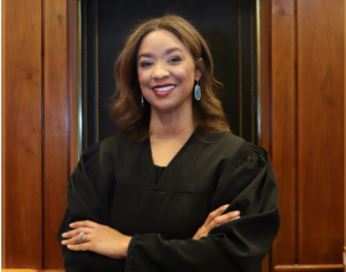By Barnett Wright
The Birmingham Times
Just because there were no jury trials in Jefferson County between mid-March and November 2020 because of the COVID-19 pandemic, that didn’t mean court officials weren’t getting work done.
“The Supreme Court of Alabama did a really good job, through the Alabama Administrative Office of Courts, of providing us with the technology we needed in order to conduct hearings [via the Zoom online videoconferencing platform],” said Jefferson County Presiding Judge Elisabeth French. “Within the Alacourt system, which is our online electronic court filing system, the judges now have the ability to go to a tab called ‘Virtual Hearings,’ … click ‘Start Hearing,’ and there it is. It’s very streamlined, very advanced, and very user-friendly.”
That was just one of the changes. Another was the temporary cessation of jury trials. Grand jury proceedings returned in October, and regular jury trials resumed in November.
Jury service is one of four responsibilities as citizens, French said: “We follow the law, we pay taxes, we vote, and we serve on juries. That jury service is extremely important; it’s the foundation of our court system. I’m a little biased because I’m a judge, but I think the judicial system is the foundation of the whole government because it’s where the people get to make the decisions. The people get to serve, and it’s an honor to serve. I want to remind people of that, especially during this pandemic.”
Administering Justice—and Safety
With that in mind, French pointed out that the courts have focused on making jury service is safe as it can be.
“We have mandatory facial coverings; those are required. We have seating six feet apart. The deliberations will not take place in a closed-up jury room like you see on TV,” she said. “[Jurors] are allowed to spread around the courtroom, so they don’t have to sit close together in the jury box. … I would like to reassure people who get summoned that we’re doing our very best to make it a safe experience and reduce the numbers of people in the room. All of those things have been taken into account.”
Going without jury trials has caused some backlog of cases.
“I do think the judges have done an amazing job, sometimes holding court hearings and putting themselves in harm’s way [during the pandemic] in order to guarantee rights because some hearings have to be done in person,” French said. “While [the pandemic] has caused a backlog, the judges have really stepped up and kept their dockets going as best as they can.”
Hearings and mediations via Zoom have allowed some cases to be heard.
“A judge can order a case to mediate, and we’ve utilized that tool,” said French. “I think once we come fully and safely out of the pandemic, … we’re trying to look at the silver lining and trying to maintain some of the ways that we kept things going safely.”
For example, French said, she can see some regular Zoom hearings.
“It’s just so easy and efficient, especially if you have lawyers who are coming from [other parts of Alabama, such as] Montgomery, Mobile, or Huntsville,” she said. “It saves them a lot of time, and I think that it will help us with the backlog.”
Family Matters

French added that it’s important to remember that judges are also affected by the same conditions as everyone else when it comes to the pandemic.
“Judges with children struggled just like all parents did,” she said. “Who was going to supervise the online schools? What were the kids going to eat for lunch while we were at the courthouse? Those are the types of things schools normally took care of. … More broadly than that, for judges who don’t have children, we all have families, we all have loved ones. … Just like everybody else, there was fear [about the virus], with deaths in the [U.S.] now exceeding 500,000. I think judges have that fear [because] we are at increased levels of exposure to the public because we serve the public. Just the fear of bringing something home has been a really big stressor for judges and for everybody.”
Procedures are in place to protect judges or judicial staff if anyone contracts the virus, French said.
“I’ve implemented a Contact Tracing Order. We have had a few infections of judges, of staff members, but what we’ve done is we had one of our employees in court administration trained with [Centers for Disease Control and Protection (CDC)] materials on how to effectively and efficiently do contact tracing, so when there’s an infection, we’ve been able to put those safety measures into place … and immediately notify anybody who was within six feet [of an infected person] for more than 15 minutes. That has helped us minimize the spread within the court system.”
Still Making Changes
Jefferson County Manager and CEO Tony Petelos said building services has also helped to make sure the environment is safe. Plexiglas has been placed in the courtrooms, which are sanitized after trials.
“We’ve furnished hand sanitizers and installed Plexiglas in all [40 Jefferson County] courtrooms,” he said. “We’ve also installed special fans that include [high-efficiency particulate air (HEPA)] filters, [which are designed to remove a high percentage of dust, pollen, mold, bacteria, and any airborne particles in a space], so judges and people in the courtrooms will feel comfortable. [In addition, we’ve established] social distance [protocols] by taping off where people can and cannot sit.”
Petelos remembers the first few months of the COVID-19 pandemic.
“I’d say March, April, May, June [2020] was the most stressful part because … we had this pandemic, and no one knew what the end game was. [Nonetheless], we had to keep planning and making changes, so we continued to do that,” explained the county manager, who last week announced that he will be retiring. “We did that for that three- or four-month period and opened back up May 1, but we continue to make changes even today.”
The downtown Birmingham Jefferson County Courthouse closed for six weeks and opened with a new way of doing business. For starters, employees were educated on how to protect themselves, face masks were mandatory, and Plexiglas was installed in various departments to separate employees. The county hired an outside sanitation crew to sanitize the facilities. Also, special fans with HEPA filters, as well as ultraviolet lights that kill any virus, were installed: “We put those in high-traffic areas,” Petelos said.
During the pandemic, municipalities nationwide faced financial challenges. Jefferson County did, too, but was able to avoid layoffs or furloughs, said Petelos.
“We’ve been able to keep everybody working,” he said. “We’ve been able to continue providing services to the people of Jefferson County, … even during the six weeks when we were shut down. Our doors were locked, … but we had a courthouse full of workers to collect the taxes and to process everything—and we did our best to keep everyone safe.”
To read more COVID-19 related stories, click one of the links below.




